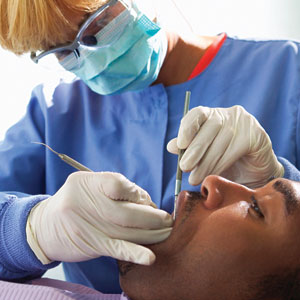It takes only a short time neglecting your oral hygiene before you begin to notice some unpleasant things with your gums: swelling, redness or even bleeding. These are all signs of gingivitis, a periodontal (gum) disease that arises from bacterial plaque, a thin biofilm that builds up on tooth surfaces when a person doesn’t brush or floss.Fortunately, early stages of gingivitis can be treated effectively with comprehensive plaque removal during one or more office visits. If, however, it’s not dealt with early, it can develop into something much more serious: acute necrotizing ulcerative gingivitis (ANUG). This form does more than leave you with unattractive teeth and gums and terrible breath — it could eventually cause you to lose your teeth.ANUG is also known as trench mouth, a common ailment among front line World War I soldiers without access to proper dental care and hygiene. It’s most prevalent today among individuals who are under a great deal of stress, not sleeping or eating well and haven’t cleaned or properly cared for their teeth for an extended period of time. Tobacco smokers also seem more susceptible than non-smokers to the disease, perhaps because smoke dries the mouth and changes the bacterial environment.Unlike common gingivitis, ANUG can be quite painful. In effect, the gum tissues begin to die (necrotize), especially the triangular peaks between teeth known as papillae. Besides the other symptoms of gingivitis, the tissues may become yellowish.ANUG can be treated effectively. The first step is to relieve the symptoms of pain and inflammation through medication. The focus then shifts to treating the underlying cause, bacterial plaque. Besides plaque removal common in any treatment for gum disease, we may also need to initiate antibiotic therapy. Metronidazole is a common antibiotic that’s been demonstrated effective against the specific bacterial strain associated with ANUG. We might also combine this with an antibacterial mouth rinse containing chlorhexidine.The final step belongs to you: to keep ANUG or any other gum disease from reoccurring, it’s important for you to adopt a daily regimen of brushing and flossing, along with regular dental visits for thorough teeth cleaning and checkups. Taking this proactive approach will help ensure you won’t suffer from this painful and unattractive form of gingivitis again.If you would like more information on acute gingivitis, please contact us or schedule an appointment for a consultation. You can also learn more about this topic by reading the Dear Doctor magazine article “Painful Gums in Teens & Adults.”
Recent Posts
- The Importance of Emergency Dental Care: Timely Intervention is Key
- Delaying Wisdom Teeth Extraction Can Lead to Serious Issues
- Can an Abscessed Tooth Kill You? Symptoms and When to Seek Urgent Care
- How to Recognize and Effectively Treat a Dental Emergency
- Gum Disease and Heart Disease: Understanding the Connection

